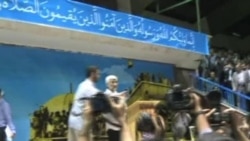The candidates in Iran's presidential election Friday are cut from strikingly similar cloth: all are men, have ties to Iran's supreme leader, and appear far more like technocrats when compared to the maverick current president.
The consensus favorite, according to most analysts, is Saeed Jalili. Iran's chief nuclear negotiator, he comes with a reputation for taking a hard line with the West.
"We seek to expand the influence of Islam in the world and resist those hegemonic powers," said Jalili.
Jalili is often described as "mild-mannered" and heads a field of mostly conservative candidates, some of whom bristled at the quiz-style format of the first debate. Mohammad Reza Aref, at one time seen as the main reformist candidate, took such offense he refused to answer questions.
Aref dropped out Tuesday at the request of former reformist president Mohammad Khatami. Khatami, Aref and other reformers are throwing their support to former chief nuclear negotiator Hasan Rowhani.
Former U.S. Ambassador Dennis Ross says that none of the candidates are standing out is by design.
“It’s pretty clear the supreme leader would like to have largely a non-factor, someone who is not going to challenge him. He would like someone in as president can basically can administer his policies, keep him above the fray," said Ross.
That's a stark contrast to President Mahmoud Ahmadinejad, who has challenged supreme leader Ayatollah Ali Khamenei and whose bombastic anti-West rhetoric has cleared U.N. halls.
Even the campaign stops are muted, with state-run TV showing candidates walking through small groups of enthusiastic supporters and offering vague assurances about Iran's struggling economy.
"We won't allow taxes to exceed a certain limit that may prevent you [merchants] from doing business," said Mohsen Rezaei.
That's far different from the 2009 election, when supporters of reformist candidate Mir Hossein Mousavi, now under house arrest, filled stadiums and took to the streets in the middle of the night to show their support.
Analyst Ross says that, too, is by the design of Khamenei, who has kept a lid on election-related dissent.
“I think he wants no level of activism. He wants no resurgence of interest," he said.
With only days left before the election, a group of graying candidates - some of whom have been absent from the political scene for years - are giving Iranians few indications they can expect much change.
This report has been updated to reflect Mohammad Reza Aref's dropping out of the presidential race.
The consensus favorite, according to most analysts, is Saeed Jalili. Iran's chief nuclear negotiator, he comes with a reputation for taking a hard line with the West.
"We seek to expand the influence of Islam in the world and resist those hegemonic powers," said Jalili.
Jalili is often described as "mild-mannered" and heads a field of mostly conservative candidates, some of whom bristled at the quiz-style format of the first debate. Mohammad Reza Aref, at one time seen as the main reformist candidate, took such offense he refused to answer questions.
Aref dropped out Tuesday at the request of former reformist president Mohammad Khatami. Khatami, Aref and other reformers are throwing their support to former chief nuclear negotiator Hasan Rowhani.
Former U.S. Ambassador Dennis Ross says that none of the candidates are standing out is by design.
“It’s pretty clear the supreme leader would like to have largely a non-factor, someone who is not going to challenge him. He would like someone in as president can basically can administer his policies, keep him above the fray," said Ross.
That's a stark contrast to President Mahmoud Ahmadinejad, who has challenged supreme leader Ayatollah Ali Khamenei and whose bombastic anti-West rhetoric has cleared U.N. halls.
Even the campaign stops are muted, with state-run TV showing candidates walking through small groups of enthusiastic supporters and offering vague assurances about Iran's struggling economy.
"We won't allow taxes to exceed a certain limit that may prevent you [merchants] from doing business," said Mohsen Rezaei.
That's far different from the 2009 election, when supporters of reformist candidate Mir Hossein Mousavi, now under house arrest, filled stadiums and took to the streets in the middle of the night to show their support.
Analyst Ross says that, too, is by the design of Khamenei, who has kept a lid on election-related dissent.
“I think he wants no level of activism. He wants no resurgence of interest," he said.
With only days left before the election, a group of graying candidates - some of whom have been absent from the political scene for years - are giving Iranians few indications they can expect much change.
This report has been updated to reflect Mohammad Reza Aref's dropping out of the presidential race.





